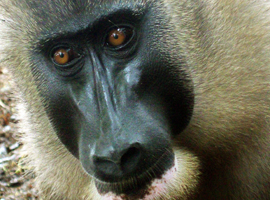‘Dramatic effect’ of bushmeat hunting on African rainforests
Researchers in Sweden say changes to the ecological makeup of Africas rainforests caused by increased hunting of bushmeat are as dramatic as those due to logging.

The study published today in the scientific journal Proceedings of the Royal Society B claims that as more monkeys and apes are killed for food by local people in Nigeria, the regeneration of the rainforest is being hampered because seeds from certain tree species cannot be dispersed by these primates.
The animals hunted include gorillas, chimpanzees (great apes), mandrills and some small species of monkey.
Ola Olsson co-author of the study from Lund University told Channel 4 News:”As the human population continues to grow, so does the demand for meat for protein.
“Even if hunting let’s say, a gorilla, is incidental, because these primates have slow life histories, their populations will be affected dramatically unlike say that of a porcupine.
“Hunting has a dramatic effect on the composition and structure of the forest, just as logging does, but without felling any trees.”
Seed spreaders
Primates are important seed dispersers due to the amount and variety of fruits they consume.
Seeds are scatted throughout the forest as they roam and defecate across large areas of forest. But researchers say in the Nigerian forests hunting has led to a fall in their numbers, which has affected their seed spreading role too.
Many of the trees which have seeds that are dispersed by primates are also important to people, because those who live in the vicinity of the forests gather a lot of fruit and nuts.
Olsson and his colleagues surveyed three different sites in Nigeria, monitoring the trees and mammals in protected as well as hunted areas over a two year period.
They found that protected areas of forests had many seedlings that rely on primates to spread their seeds. But areas of forest where hunting was prevalent had seedling species that relied on wind to disperse their seeds.
According to Olsson in a generation hunted areas could fundamentally change forest ecology and there are concerns there will be knock-on effects on all biodiversity.
-
Latest news
-
Local Elections Debate: voters question five main parties41m

-
Local Elections: Conservatives face 400 seat loss exclusive analysis reveals4m

-
Post Office Inquiry: ‘no cover-up’ insists former executive2m

-
Scotland politics: SNP leader future in doubt after opposition move3m

-
Military horses rampage through streets of London2m

-




